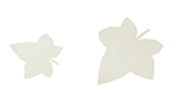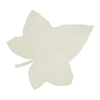|
Fennel
- Foeniculum
vulgare
The
hardy Fennel plant is a striking 5 - 7 foot perennial
with feathery leaves and tall stalks reaching up
to umbels of yellow flowers, which flower during
July and August and are followed by the ribbed oval-shaped
seeds which are greenish grey in colour and wonderfully
aromatic. All parts of the Fennel plant have a delicious
aniseed aroma.
Fennel
Seeds have been used for centuries as a spice and
food preservative, and both the seeds and leaves
are widely used in a variety of meat and fish dishes
throughout Europe. Fennel is an excellent remedy
for wind and indigestion, also very effective at
warding off hunger pangs and was a favourite during
the Mediaeval times during fasting. The Greeks called
the plant marathron, reputedly being derived from
a verb meaning "to grow thin" and it have
been used as an early slimming aid. To stave off
hunger pangs between breakfast and lunch try Fennel
seed tea sweetened with honey as a breakfast tea
- eat the seeds afterwards for their nutritional
value. Alternatively try a cup of Fennel seed tea
after a meal to aide digestion and sweeten the breath.
Chewing
on the seeds is an effective remedy for bad breath
- a mouthwash made from infusing a teaspoon of Fennel
seeds to one cup of boiling water (allow to cool
and strain before using) makes an effective remedy
for gum disease, sore throats and is a welcome ingredient
in herbal toothpastes.
The
Greeks also used teas made from Fennel to remedy
asthma and other respiratory ailments. Fennel contains
creosol and alpha-pinene, compounds which are known
to help loosen bronchial secretions. Fennel seeds
can contain as much as 8,00 parts per miollion of
alpha-pinene.
Fennel
has compounds that act like the female hormone oestrogen
and the seeds have been used in infusions for centuries
to promote milk flow in nursing mothers. It is also
commonly used as a remedy for colic and painful
teething in babies.
Fennel
seeds have been used for thousands of years to remedy
sore eyes and conjunctivitis and to bring a sparkle
to the eyes. Make an infusion just as you would
for a cup of tea, leave covered for 10 minutes,
strain and when cool enough use as an eyewash, or
soak cotton pads in the infusion and place over
the eyelids - relax for 10 minutes before removing.
The infusion can also be used cold.
Fennel seeds are also a healing, cleansing ingredient
for facial steams.
Fennel
is a carminative, anti-spasmodic herb. It is also
a mild laxative and is especially helpful for constipation
caused by tension. Fennel Tea is also a folk remedy
for relieving the aches and pains of flu.
In
folklore Fennel was used in some regions to decorate
houses at Midsummer to keep negative spirits at
bay.
!
Sweet Fennel essential oil should be used in moderation
and with caution !
! The essential oil is not recommended for use by
epileptics !
! Because of its estrogenic effect pregnant women
should avoid medicinal amounts of the herb and should not use the essential oil ! |











